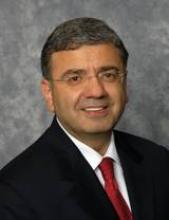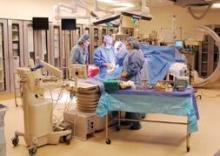The field of cardiology is undergoing a quiet and gradual revolution.
Emerging new technologies are bringing together subspecialties that have long been at odds with one another. Also arising is a new breed of specialists who have a new vision for cardiovascular medicine.
The procedure that lies at the heart of this movement is transcatheter valve therapy.
Although open valve replacement, a highly successful and durable treatment, remains the standard treatment for patients with severe aortic stenosis, patients too sick for surgery have few options: They are medically treated or undergo balloon aortic valvuloplasty.
But transcatheter valve replacement devices have the potential to improve the dismal landscape inoperable patients now face. Devices for transcatheter aortic valve replacement (TAVR) have been commercially available in Europe since 2007. Just this week, on Nov. 2, the Food and Drug Administration approved the first such device for use in the United States, and another is undergoing clinical trials.
"It’s a major breakthrough for [valve replacement,]" said Dr. William A. Zoghbi, the American College of Cardiology’s incoming president and the director of the Cardiovascular Imaging Institute at Methodist Hospital in Houston. "This was not present more than a decade ago, and now it’s becoming a reality. We had patients who had no other option."
What’s also significant about TAVR, experts say, is the mandated teamwork between cardiac surgeons and interventional cardiologists.
In dozens of hospitals and medical centers across the nation participating in either the Edwards Sapien valve trial or Medtronic’s CoreValve pivotal trial, cardiac surgeons, interventional cardiologists, and medical cardiologists gather almost weekly to discuss the best treatment options for patients. They perform the procedure side by side in hybrid operating rooms and learn new skills from each other.
The therapy can "change medicine forever," said Dr. Augusto D. Pichard, director of the cardiac catheterization lab at the Washington Hospital Center, which is a participant in Edwards Lifesciences’ PARTNER (Placement of Aortic Transcatheter Valve) trial of its Sapien valve (N. Engl. J. Med. 2010;363:1597-607).
"It’s proving that multidisciplinary medicine is indispensable," said Dr. Pichard, who is one of the trial’s principle investigators at the hospital.
Such multidisciplinary "Heart Teams" as required by the PARTNER trial, or Medtronic’s CoreValve trial, are not new to cardiology.
The SYNTAX trial, which compared the TAXUS drug-eluting stent with coronary artery bypass surgery, required interventional cardiologists and cardiac surgeons to review the angiography results together to decide the best treatment for patients.
Heart Teams also showed to be successful in the EVEREST II trial that compared percutaneous mitral valve repair using Abbott Vascular’s investigational MitraClip with conventional surgical repair or replacement (N. Engl. J. Med. 2011;364:1395-406).
"Such a Heart Team will be even more critical as the issue with structural heart disease become more complex, as the treatment expands to more centers, and as new technology is applied outside of the constraints of randomized clinical trials," wrote Dr. David R. Holmes Jr. of Mayo Clinic, Rochester, Minn., who is president of the ACC, and Dr. Michael J. Mack of Medical City Dallas Hospital, who is president of the Society of Thoracic Surgeons, in an expert consensus document on transcatheter valve therapy. (J. Am. Coll. Cardiol. 2011;58:445-55).
Transcatheter valve therapy is a "transformational technology," that is, "one that, when introduced, radically changes markets, creates wholly new markets, or could even eliminate existing markets for older technology," they wrote.
Having gotten a glimpse into the future through trials such as PARTNER, Dr. Mathew Williams, one of a new breed of so-called hybrid cardiovascular specialists, says it’s important to have dual training in the rapidly evolving field of invasive cardiovascular medicine.
Being a cardiac surgeon without knowing any "wire skills" is somewhat outdated. "You need to know both," said Dr. Mathew Williams.
Cardiac surgeons and interventional cardiologists "treat the same diseases and deal with the same patients. They just use different skill sets," said Dr. Williams, surgical director of Cardiovascular Transcatheter Therapies at New York–Presbyterian Hospital/Columbia University Medical Center.
He is among a handful of cardiologists who have recently trained as both cardiac surgeons and interventional cardiologists.
After completing his training in cardiac surgery, he completed a 1-year fellowship in interventional cardiology.
"I decided to do it because that’s where a lot of valve diseases are headed," said the 41-year-old in an interview. Being a cardiac surgeon without knowing any "wire skills" is somewhat outdated. "You need to know both."



